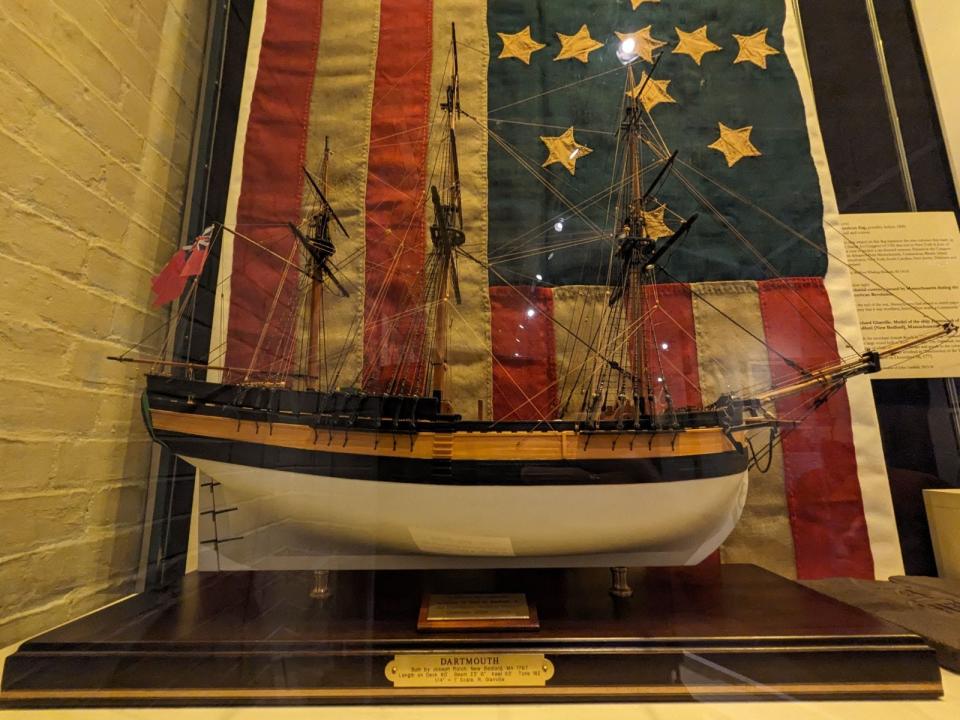Boston Tea Party 250th anniversary: How this New Bedford ship was involved
NEW BEDFORD — When you think back to your childhood history classes one of the major historical events that comes to mind, especially if you're from Massachusetts, is the Boston Tea Party. That pivotal act of defiance from the colonists against the British monarchy brought on by extreme frustration over “taxation without representation." occurred 250 years ago on Dec. 16, 1773.
You may remember learning about American colonists dressed in Native American garb dumping 342 chests of imported tea in the Boston Harbor in protest of the Tea Act that allowed the British East India Company to tax the colonists on their beloved tea. But did you learn about New Bedford's part in this monumental protest?

What does New Bedford have to do with the Boston Tea Party?
Often known as a founding family of New Bedford, Joseph Rotch and his sons brought their successful whaling industry to the New Bedford harbor in the 1760s.
They were an affluential Nantucket Quaker family who brought big business to the then-named Bedford Village of Old Dartmouth, now New Bedford, putting it on the map as a leading ship-building community with their construction of the "Dartmouth."
The Dartmouth was commissioned to be built in 1767 as a cargo carrier/ whaleship with its maiden voyage being to London, England to deliver a shipment of whale oil.
As customary of the period during such voyages, a decree from Parliament made it so that American ships selling goods had to buy tea as part of their freight to return to the colonies. The captain of the Dartmouth unknowingly filled his ship with the now infamous British East India Company tea.
As the Dartmouth set sail to Boston, The Sons of Liberty were already rallying the troops back home leading protests that stopped the offloading of taxed cargo. On Nov. 28, 1773, the Dartmouth was the first ship with the cursed tea cargo to arrive in Boston, the owner Joseph Rotch’s son, 23-year-old Francis, had 20 days to unload his cargo and pay the tea tax before his ship would be seized to pay customs duties.
Unable to unload his cargo or leave the harbor without paying the tea tax, Rotch struggled with what to do with the looming deadline, as over 5,000 of Boston's residents demanded he return the cargo to London, a task he was not allowed to do without special permission from Boston's Governor. According to reports he stated, “Gentlemen, I can not. It is wholly impractical. It would cause my ruin.”
On the night before the deadline with the governor's refusal to give permission, the Sons of Liberty famously said "Who knows how tea will mingle with sea water?" thus commencing the preplanned act of treason. When thinly disguised Boston citizens boarded the ships in the harbor including the Dartmouth and methodically threw 342 chests of British Tea worth over $1M in today's money into the harbor.
The Dartmouth foundered in November of 1774 during a return voyage from London, the crew was rescued and returned to Boston.
How to commemorate the 250th anniversary of the Boston Tea Party
A live reenactment will take place at 8 p.m. Saturday, Dec. 16 at the Boston Harbor, along with a host of events taking place at the https://www.december16.org/boston-tea-party-reenactment.
Closer to home you can visit the New Bedford Whaling Museum and check out the model of the Dartmouth that was unveiled 10 years ago marking the the 240th anniversary of the Boston Tea Party. For information about the museum, visit whalingmuseum.org.
This article originally appeared on Standard-Times: New Bedford ship was part of the Boston Tea Party

